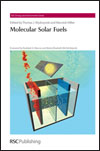Now Published in the RSC Energy and Environment Series
Molecular Solar Fuels
Edited by Thomas J. Wydrzynski and Warwick Hillier
World demand for energy is rapidly increasing and projections suggest that energy consumption will more than double by the year 2050. The challenge we face today is how to develop carbon-neutral energy sources. Sunlight accounts for the largest energy input into the earth’s surface providing more energy in one hour than all of the energy consumed by the entire planet in one year. If sunlight could be captured and efficiently stored, such as in the chemical bonds of a molecular fuel then potentially a virtually unlimited supply of clean energy would be available.
In the quest for clean, energy-rich fuels we must take advantage of natural photosynthetic and hydrogenase systems, by adapting the energy conserving principles of nature. To achieve this goal cutting-edge photochemical conversion technologies and breakthroughs in the understanding of natural photosynthetic and hydrogen producing systems are essential.
In this exemplary new book on molecular solar fuels the editors present recent progress in this area of research by bringing together researchers working on natural systems with those developing synthetic chemical catalysts with the central aim of creating clean, high energy fuels driven by sunlight.











